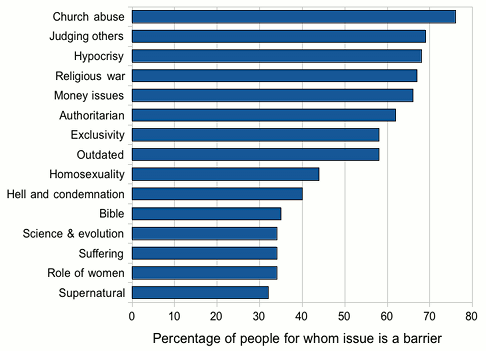Unlike America, christianity has never been very strong in Australia. Something like 70% believe in a god, and about 50% identify with a religion (40% christian, 10% other), but only around 10% attend church regularly. Most Aussies are not very interested in church. (This is perhaps understandable, with many good options available on Sundays: sport, the beach, barbecues, picnics or just relaxing, or even mowing the lawn.)
But an interesting new survey has studied the barriers to belief.
The survey
A survey of over a thousand people, The Australian Communities Report was conducted to find out what Aussies think about christianity and the church. This post is based on a summary of the report which can be downloaded.
The barriers to faith
The report lists the following as the “Top ten belief blockers”:
- Church abuse
- Hypocrisy
- Judging others
- Religious wars
- Suffering
- Issues around money
- Church being outdated
- Hell and condemnation
- Homosexuality
- Exclusivity
When I look at the data provided, and add up the figures for issues which are very strong or significant barriers, I get this list (the slightly different order shows that the report must use a slightly different definition):

What does it all mean?
This useful information for christians and churches wanting to follow Jesus. I draw the following conclusions:
- The behaviour of christians and churches seems to be far more of a barrier than the the teachings.
- In particular, we need to show people we are not hypocritical, judgmental or exclusive, all things that weren’t true of Jesus – which means we have to not be these things.
- We need to think and pray about how we come across on issues like homosexuality, hell, the role of women and science & evolution. Are we sure we have our teachings right? In the case of hell (see Hell – what does the Bible say?) and evolution, I believe many christians clearly have them wrong. In other cases, we may also be wrong or inconsistent, and we certainly don’t come across well.
- On some issues (e.g. church abuse and suffering) we may just have to cop it on the chin, express our sympathy and solidarity with those who suffer, and start to do more about alleviating the problems.
- There are some issues, notably religious wars (see Does religion cause wars?) and money issues, people may well have the wrong idea, and we need to be able to explain this if it arises.
These are important issues, and I intend to return to some of them in more detail. Watch this space!
For some more background, see The future of the church and Worldwide belief in God.
I’m fascinated by your list and suspect things might easily be similar here in the States. I don’t know if you’ve come across the book, “Unchristian” by David Kinnamen based on research by The Barna Group. It looks at the perceptions about the church of non believers, if I remember right between the ages of 18 and 35 in this country. The figures were astounding. We are seen as anti-gay (91%), judgemental (87%) and hypocritical (85%).
I’ve also suspected for some time that the church’s view of women is a problem for many. I’m interested by your figure that for more than 30% of people, it is a barrier to belief.
As an outsider looking in to the US (but also with a close relative there) I am not surprised by those Barna figures. It seems that for many christians, the central issues of faith are homosexuality and abortion, and they are very judgmental about them. Non-believers see this, and the unfortunate lapses by high profile christians, and see it all as hypocrisy.
I converse on the internet a bit, and I find many ‘christians’ to be quite nasty (in my view) in their comments to unbelievers, almost to the extent that it seems they would rather be condemning them than reaching out to them – and on a number of occasions when I have pointed out NT passages that require us to be “gentle and respectful” etc, they refuse to accept that this applies to them. It is a little scary.
[…] Christian exclusivism and ethical beliefs about sex and sexuality are often expressed in insensitive and even hateful ways. This is another response that many teens will react against. […]